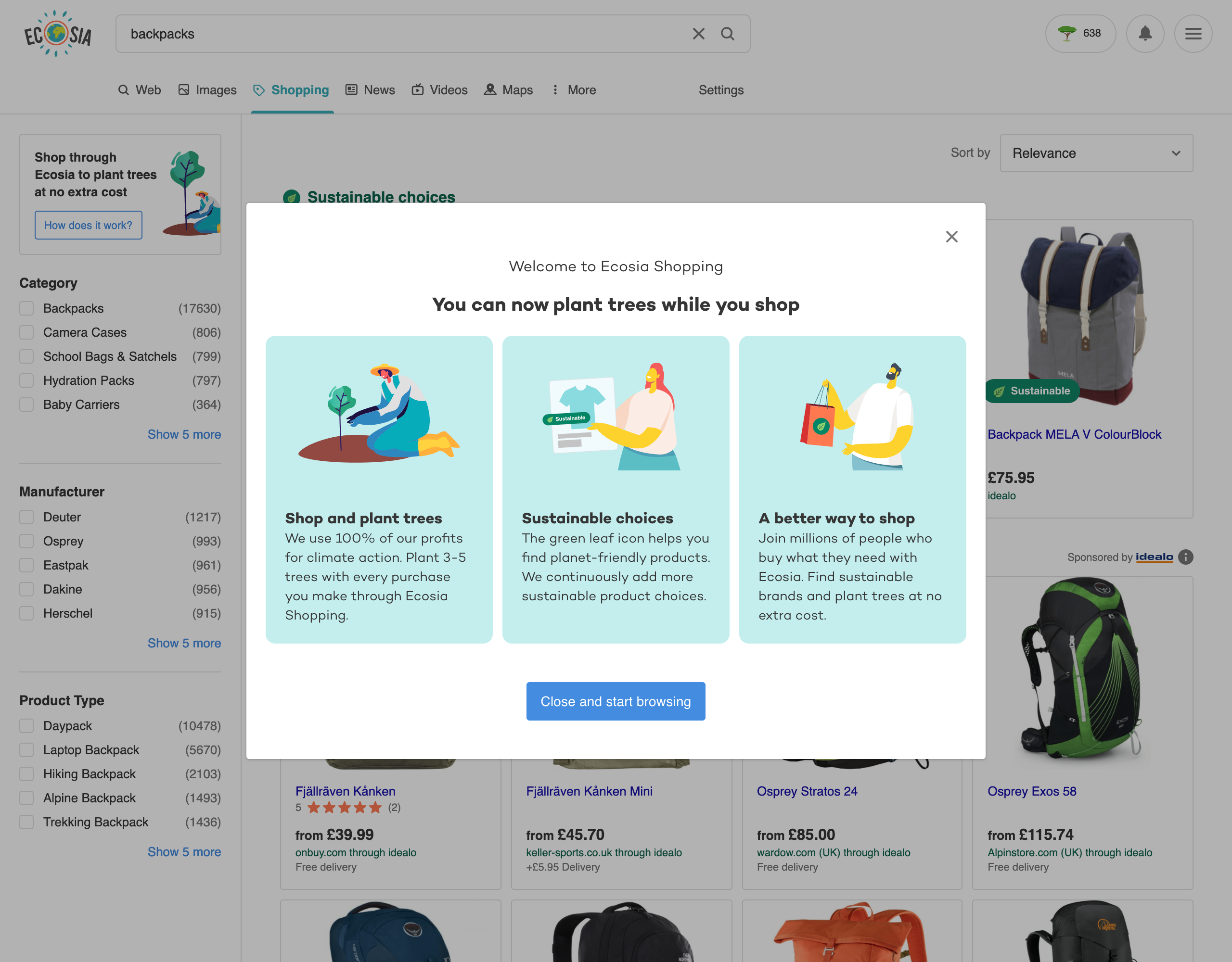Tree-planting search engine Ecosia launches Shopping feature for refurbished and sustainable products
Exclusive: Ecosia is partnering with shopping giants like Amazon to recommend greener choices directly from search results

Your support helps us to tell the story
From reproductive rights to climate change to Big Tech, The Independent is on the ground when the story is developing. Whether it's investigating the financials of Elon Musk's pro-Trump PAC or producing our latest documentary, 'The A Word', which shines a light on the American women fighting for reproductive rights, we know how important it is to parse out the facts from the messaging.
At such a critical moment in US history, we need reporters on the ground. Your donation allows us to keep sending journalists to speak to both sides of the story.
The Independent is trusted by Americans across the entire political spectrum. And unlike many other quality news outlets, we choose not to lock Americans out of our reporting and analysis with paywalls. We believe quality journalism should be available to everyone, paid for by those who can afford it.
Your support makes all the difference.Ecosia, the search engine that uses its profits to plant trees, is launching a new shopping feature.
The company, which was founded in 2009, donates its expendable funds to tree-planting organizations. It claims to have planted 130 million trees across 30 countries around the world.
Ecosia Shopping recommends products on Amazon, Kelkoo and Idealo, and other shopping partners that have been sustainably made, are reused, or have been refurbished. The feature is available now in the UK, Germany and France.
The search company takes a small percentage from these affiliate links (between two and five per cent) and use the revenue to continue its green endeavour.
It usually takes approximately 50 searches to raise the funds to plant a single tree, Ecosia says, but its new Shopping feature could raise those funds significantly faster depending on how expensive the products being bought are.
Working with the Technical University of Berlin and the Berlin University of Technology, researchers select a range of green alternatives for the top 20 product categories – including backpacks, clothing, and sportswear – to recommend at the top of its search results. Over time, Ecosia will introduce more categories to provide consumers with greener choices.

Changing consumer’s search preference is a huge task for Ecosia. Google has a near-monopoly in the search market, with 92 per cent control as of November 2021. Microsoft’s Bing, the second largest search engine which provides the algorithm that Ecosia uses, has just under 4.5 per cent share by comparison.
For the company, “the big challenge is to get people to break their shopping habits”, Ecosia’s founder and chief executive Christian Kroll told The Independent. “A lot of people are just going to Amazon, now they need to go to Ecosia.”
Ecosia partnering with Amazon may raise a few eyebrows for sustainable buyers; the shopping giant was recently found to be destroying millions of items - including smart TVs, laptops, drones, and more – per year, rather than donate them. Amazon claimed that “no items are sent to landfill in the UK” and that “as a last resort, [it] will send items to energy recovery”.
Mr Kroll says that Ecosia had “big discussions” around working with Amazon, but that in order to have “the biggest impact possible” it was working with them because of consumer demand for convenience, good prices, and choice – even for people making green purchases.
“We have very little time and I think we can’t be ideologists in all areas”, he said, with the company “hav[ing] to pick whatever basically solves the problem fastest”.
The need for conscious consumption is an increasingly pressing concern for shoppers, according to researchers. “Shoppers are becoming more conscientious and placing a higher value on sustainability in their choices. Our data shows consumers increasingly want to buy from retailers who share their values, even if it costs them more money”, Brian Green, head of solutions at Adobe which gathers data about shopping habits, told The Independent.
Over one third of UK shoppers buy from smaller retailers because of the smaller environmental footprint, while one-in-four plan to buy second-hand in the run-up to Christmas. “Products which are marketed as sustainable are growing more than five times faster than those that aren’t”, he added. “It’s clear people want to buy from a good cause, and retailers should certainly be taking note.”
Addressing climate change does not just mean consumers making greener choices when shopping, though; it also means buying less altogether and “disrupting our current patterns of production and consumption” according to Dr Teresa Domenech Aparisi, a lecturer in industrial ecology and the circular economy at University College London.
Material consumption by the world’s cities is expected to grow from 40 billion tonnes in 2010 to about 90 billion tonnes in 2050, according to the International Resources Panel.
“While increasing the awareness of citizens and providing information to inform better choices in terms of sustainability is something needed, it is also important to emphasise that the best sustainable choice is always avoiding buying something you don’t need,” Dr Domenech told The Independent.
Even when pushing a new shopping feature, Mr Kroll agrees with this assessment. “The best purchase is no purchase at all”, he said, but that mainstream shoppers are “pretty far away” from that extreme.
“We need to nudge users gently – and there are a few users probably who are willing to go much further and drastically reduce their entire consumption – [because] there are a lot of people who are starting their sustainability journey and, for them, it would be a big, big, thing if for the first time in their life they actually bought a refurbished product.”
Join our commenting forum
Join thought-provoking conversations, follow other Independent readers and see their replies
Comments